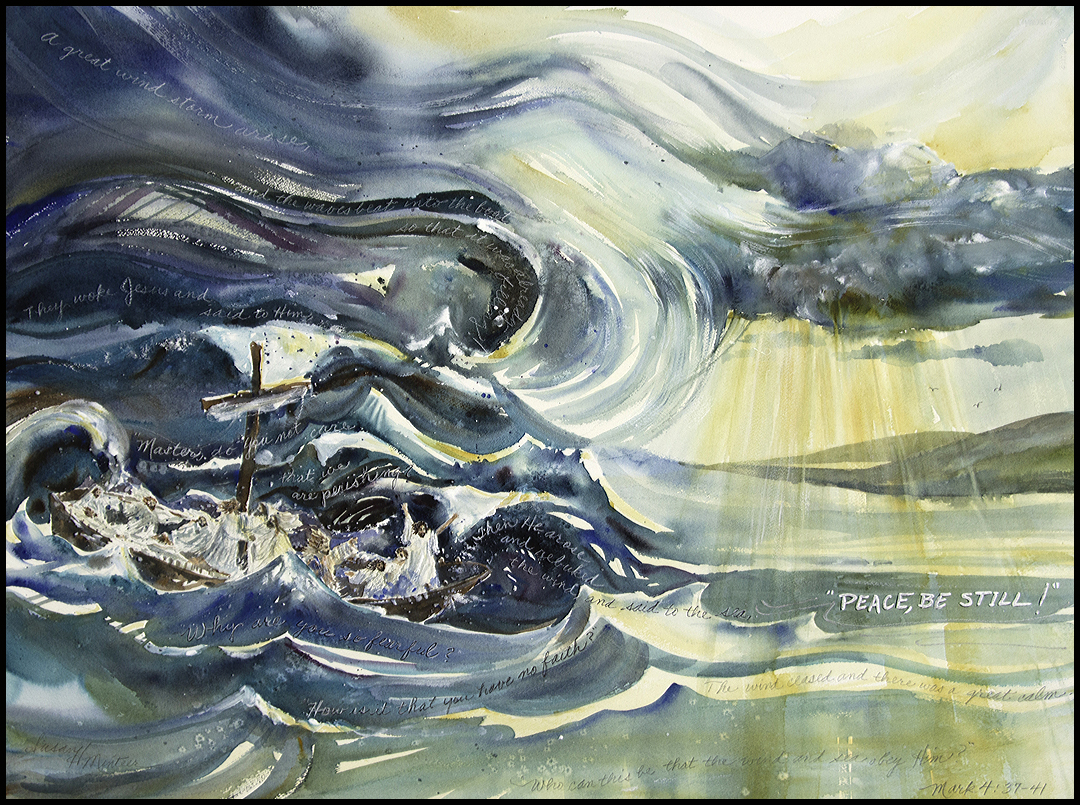I shared last week that faith is often like walking with your eyes open through thick fog. We see, not always clearly, and second-guess most things. Today’s scripture articulates the tension of faith – we often are looking for a sing, a miracle, a word: proof – and yet “while miracles can unsettle and challenge our worldview and prompt the reason of questions about Jesus’ identity, they cannot provide the answer to such questions.” (Ben Witherington III in The Gospel of Mark, p 173.).
Today’s story is one of transition. Verse 34 ends a long block of text relating teaching and parables of Jesus. Now in verse 35 we are in a narrative, in which Jesus is acting and moving. Up until 4:34 we were in Jewish lands. Now the disciples are crossing the Sea of Galilee for “the other side” (4.35) where they will arrive in Gentile [non-Jewish and thus non godly] lands 5:1. It’s a transition of the understanding of the disciples. They think that they’re getting it, coming to truly know Jesus; and suddenly they’re terrified and in awe, unsure of who he is. They call him teacher (rabbi) but don’t understand how much more than a teacher he is.
Look at what Jesus says and what the disciples say in the sparsely narrated story. The last time that they speak directly to Jesus, asking a question (at least in Mark’s telling of the gospel story) is in 1:37. It’s then and there that they finally find Jesus and declare in a panicked state “Everyone is searching for you.” Here they seem to doubt the care, love and power of Jesus in 4:38 : “Teacher, do you not care that we are perishing?” It’s not that Jesus is callous or cold. Rather him sleeping implies his fatigue from working and teaching, and also his trust in God and/or non-fear of the storm.
This storm isn’t just any storm. It’s a superhuman one. The word “megas” Greek for great – is used 3 times in the 6 verses in 37, 39, 41. Only one greater than this great storm could calm it and bring about a great calm. Jesus rebukes the wind as he does the unclean spirit in Mark 1:25. The disciples, who regularly worked on the lake as fishermen, are terrified. This isn’t just “any” storm.
In the First Testament we encounter repeated affirmations that only God can calm the sea (Job 26:11-12; Psalm 104:7 & Isaiah 51:9-10). In fact for the Israelites, who were farmers, not sea going peoples like the Philistines, Greek and Romans, the ocean was a place of fear, of Leviathan – the mythical sea-monster that challenged the good powers of God. This encounter is not just a storm, but a cataclysmic, eschatological battle between the forces of the Lord and those that resist him. Jesus doesn’t just do something miraculous. He does what only God can do. Is it any wonder that the story ends with the disciples asking “who then is this?” They’ve heard about God’s power in the parables; but now they witness it first-hand in the person of Jesus.
Questions for going deeper:
- What word phrase or image in the text shimmers for you?
- How does it intersect with or touch your life today?
- What invitation do you hear to be, act, speak or relate in today’s text?
